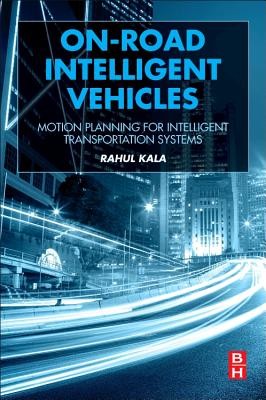
- We will send in 10–14 business days.
- Author: Rahul Kala
- Publisher: Butterworth-Heinemann
- ISBN-10: 0128037296
- ISBN-13: 9780128037294
- Format: 15.2 x 22.6 x 2.5 cm, minkšti viršeliai
- Language: English
- SAVE -10% with code: EXTRA
Reviews
Description
On-Road Intelligent Vehicles: Motion Planning for Intelligent Transportation Systems deals with the technology of autonomous vehicles, with a special focus on the navigation and planning aspects, presenting the information in three parts. Part One deals with the use of different sensors to perceive the environment, thereafter mapping the multi-domain senses to make a map of the operational scenario, including topics such as proximity sensors which give distances to obstacles, vision cameras, and computer vision techniques that may be used to pre-process the image, extract relevant features, and use classification techniques like neural networks and support vector machines for the identification of roads, lanes, vehicles, obstacles, traffic lights, signs, and pedestrians.
With a detailed insight into the technology behind the vehicle, Part Two of the book focuses on the problem of motion planning. Numerous planning techniques are discussed and adapted to work for multi-vehicle traffic scenarios, including the use of sampling based approaches comprised of Genetic Algorithm and Rapidly-exploring Random Trees and Graph search based approaches, including a hierarchical decomposition of the algorithm and heuristic selection of nodes for limited exploration, Reactive Planning based approaches, including Fuzzy based planning, Potential Field based planning, and Elastic Strip and logic based planning.
Part Three of the book covers the macroscopic concepts related to Intelligent Transportation Systems with a discussion of various topics and concepts related to transportation systems, including a description of traffic flow, the basic theory behind transportation systems, and generation of shock waves.
EXTRA 10 % discount with code: EXTRA
The promotion ends in 21d.03:11:37
The discount code is valid when purchasing from 10 €. Discounts do not stack.
- Author: Rahul Kala
- Publisher: Butterworth-Heinemann
- ISBN-10: 0128037296
- ISBN-13: 9780128037294
- Format: 15.2 x 22.6 x 2.5 cm, minkšti viršeliai
- Language: English English
On-Road Intelligent Vehicles: Motion Planning for Intelligent Transportation Systems deals with the technology of autonomous vehicles, with a special focus on the navigation and planning aspects, presenting the information in three parts. Part One deals with the use of different sensors to perceive the environment, thereafter mapping the multi-domain senses to make a map of the operational scenario, including topics such as proximity sensors which give distances to obstacles, vision cameras, and computer vision techniques that may be used to pre-process the image, extract relevant features, and use classification techniques like neural networks and support vector machines for the identification of roads, lanes, vehicles, obstacles, traffic lights, signs, and pedestrians.
With a detailed insight into the technology behind the vehicle, Part Two of the book focuses on the problem of motion planning. Numerous planning techniques are discussed and adapted to work for multi-vehicle traffic scenarios, including the use of sampling based approaches comprised of Genetic Algorithm and Rapidly-exploring Random Trees and Graph search based approaches, including a hierarchical decomposition of the algorithm and heuristic selection of nodes for limited exploration, Reactive Planning based approaches, including Fuzzy based planning, Potential Field based planning, and Elastic Strip and logic based planning.
Part Three of the book covers the macroscopic concepts related to Intelligent Transportation Systems with a discussion of various topics and concepts related to transportation systems, including a description of traffic flow, the basic theory behind transportation systems, and generation of shock waves.


Reviews